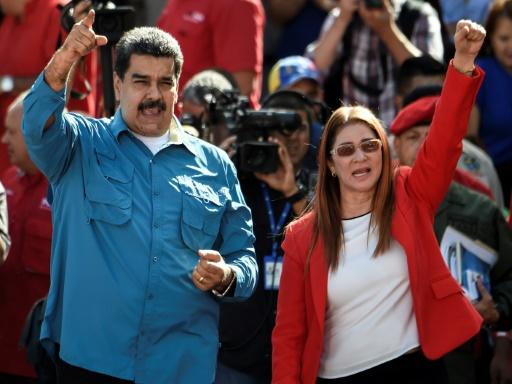
Venezulean President Nicolas Maduro could serve a seond presidential term, on January 26, 2018. Photo: AFP
Venezuela's opposition scrambled to reset itself Friday after a top court barred the main coalition from contesting the upcoming presidential election, paving the way for a second term for unpopular President Nicolas Maduro.
The Supreme Court, in a shock ruling Thursday, effectively ordered the national election council to exclude the Democratic Union Roundtable (MUD).
The opposition had already been thrown into disarray by the government's decision to hold snap elections months ahead of schedule.
French President Emmanuel Macron denounced the Venezuelan government's "unacceptable authoritarian slide" following the court move, and said he was in favor of increasing European Union sanctions.
He said France and its EU partners would "coordinate to see if we want to increase our sanctions," adding: "I am in favor."
The Maduro-dominated Constituent Assembly decided earlier in the week that elections must be held by the end of April, leaving a raft of opposition parties scrambling to begin the process of finding a candidate to unify its vote.
But now the opposition coalition has been barred by the court, which did not state the grounds for its order.
The move effectively robs the opposition of running a unified campaign under the banner of the MUD, as it has previously.
"The government wants to remove the opposition so that it cannot compete in a free election and defeat Nicolas Maduro," said Tomas Guanipa, head of the Justice First party.
Leading opposition parties Justice First and Democratic Action on Friday called on their supporters to turn out en masse over the weekend in a drive to re-register for the elections.
The MUD cannot re-register because it is not an opposition party but an alliance.
- 'Risk of violence' -
Analysts said the double blow to Maduro's opponents left them with limited options -- and heightened the risk of a return to violence in the crisis-hit country.
"Maduro's institutional control, and the ability to shape the outcome of the election, leaves social upheaval as the main catalyst for any eventual regime change," said Risa Grais-Targow, Latin America director for market analysts Eurasia.
"The latter remains a viable possibility, given the fact that the economic crisis is careening to new extremes on multiple fronts."
Venezuela, hard hit by sharply lower oil prices on the global market, is enduring one of the worst crises in its history. Inflation for this year is forecast to hit 13,000 percent.
From April to July last year, angry Venezuelans took to the streets in protest, with 125 people killed as the demonstrations degenerated into clashes with security forces.
"Since the holidays, low-grade spontaneous unrest has been occurring across the country in response to the government's inability to provide basic goods," said Grais-Targow.
"The unrest remains uncoordinated and the security apparatus has so far been willing to repress it. But that could very well start to change if it explodes into a more acute social crisis that sees millions of people taking to the streets over a sustained amount of time."
Maduro -- the handpicked successor of late socialist icon Hugo Chavez -- has long drawn criticism at home and abroad, accused of running a leftist dictatorial regime in this oil-rich and once prosperous country now facing economic ruin with acute shortages of food and medicines.
- Barred from running-
Many of the opposition's leaders were already barred from running, and the parties were desperately trying to find a candidate to unify their forces.
There are clear divisions in the ranks between those who reject Maduro and those who see compromise as the only way forward out of the simmering crisis.
The parties that make up the coalition had been told they must re-register with electoral authorities after boycotting local and regional polls last year, claiming government fraud.
Dominican President Danilo Medina, who has been overseeing talks between Maduro's government and the opposition, has said that both sides will return to the negotiating table in Santo Domingo on Sunday and Monday.
But the opposition has not confirmed its attendance.


